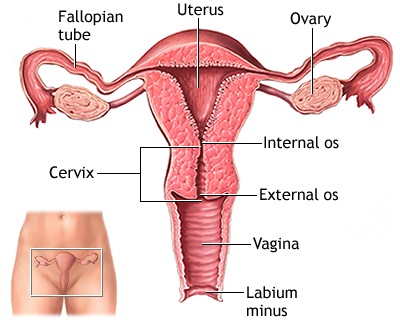 The womb or uterus is located in your pelvis and may enlarge due to a number of reasons. You may have an enlarged or swollen uterus due to benign uterine tumors, known as fibroids. If you're in a childbearing age, your uterus may enlarge due to pregnancy. Young women who have just started having their periods may have an enlarged uterus due to a blockage of menstrual blood flow. You need to know the exact cause of your large uterus to be able to identify the best treatment option.
The womb or uterus is located in your pelvis and may enlarge due to a number of reasons. You may have an enlarged or swollen uterus due to benign uterine tumors, known as fibroids. If you're in a childbearing age, your uterus may enlarge due to pregnancy. Young women who have just started having their periods may have an enlarged uterus due to a blockage of menstrual blood flow. You need to know the exact cause of your large uterus to be able to identify the best treatment option.
Causes and Treatments for Enlarged Uterus
You may experience different symptoms when your enlarged uterus is caused by a certain condition. Accordingly, you may notice heavy menstrual flow, menstrual pain, abdominal pain, menstrual cramps, and blood clotting, frequent urination, constipation, lower back pain, pelvic pain, and pain during sex, tender breasts, backache, etc. Here's a bit more about some of the most common conditions that may enlarge your uterus.
1. Menopause
The shape and size of your uterus will change with age, and enlarged uterus is usually a common problem for women approaching menopause. This happens due to hormonal changes because the fluctuations in hormones may feel as if you're pregnant that in turn increases the size of your uterus.
2. Pregnancy
Certain physiological changes will also affect the size and shape of your uterus. You are more likely to have an enlarged uterus during pregnancy, and its size will keep increasing until the end of your pregnancy. It is actually essential for your uterus to enlarge and accommodate the baby. You may also have an enlarged uterus due to a miscarriage or an ectopic pregnancy. A molar pregnancy may also cause excessive uterine growth.
3. Andenomyosis
You may notice your uterus getting enlarged if you develop a condition called Andenomyosis. The exact cause of Andenomyosis is still unclear, but it could happen due to invasive tissue growth, uterine inflammation and stem cell origins. Some experts are of the view that Andenomyosis grows inside your uterine muscle.
Treatment: Your doctor may consider the severity of your symptoms and select specific treatment options. They may use anti-inflammatory drugs such as ibuprofen to alleviate pain and control inflammation or they may opt for hormone medications, such as combined estrogen-progestin pills, vaginal rings or hormone containing patches which help reduce bleeding. For severe pain, your doctor may ask you to go for a surgical procedure to completely remove your uterus. Whatever the treatment option is, be sure to take warm baths, use heating pads on your abdomen, and stick to OTC medication for pain relief.
4. Uterine Fibroids
If enlarged uterus is caused by uterine fibroids or fibroid tumors, you may or may not show symptoms. The exact causes of uterine fibroids aren't clear yet, but the experts believe it has something to do with hormone stimulation and genetic predisposition.
Treatment: The treatment will change in line with the location, size and vascularity of your fibroids. How severe the symptoms are will also have an impact on what treatment option works best. Drug therapy is usually the first choice, which may include hormone therapy, birth control pills and anti-inflammatory drugs. Your doctor may use endometrial ablation to deal with heavy bleeding or even recommend surgery to remove the fibroids manually. One effective way is to burn the fibroids with MR guided focused ultrasound ablation.
5. Ovarian Cysts
Ovarian cysts usually develop when your menstrual cycle completes. The functional cysts are not always painful, but you may sometimes experience pain and inflammation as well.
Treatment: The treatment depends on a number of facts, including the size and type of your cyst. Your age matters as well. Sometimes, you don't need any treatment and the cyst goes away without causing any problems. You may require ultrasound tests periodically to ensure the size of your cyst isn't changing. Using birth control pills is another available option. You may even consider going for surgery if your cyst is quite large.
6. Uterine Cancer
The size and shape of the uterus may change due to any problems with the endometrium mucus lining. This usually leads to an enlarged uterus, but you may notice other symptoms due to a different type of uterine cancer mainly caused by abnormal growth of cells in your uterus.
Treatment: You will have to work with a team of doctors to evaluate your condition and identify the best treatment plan. A gynecologic oncologist usually helps determine the best treatment option, including chemotherapy, surgery, hormone therapy or radiation therapy. Sometimes, they will use a combination of treatments depending on your age, side effects, type of cancer and the stage of your cancer.
When to See a Doctor
It is not easy to detect a large uterus without thorough examination. You should consult with your doctor if you're experiencing certain signs of enlarged uterus. The symptoms may vary from woman to woman, but they are usually enough to tell your doctor that something is not right. Your doctor may recommend further tests to evaluate your condition and suggest a treatment plan.